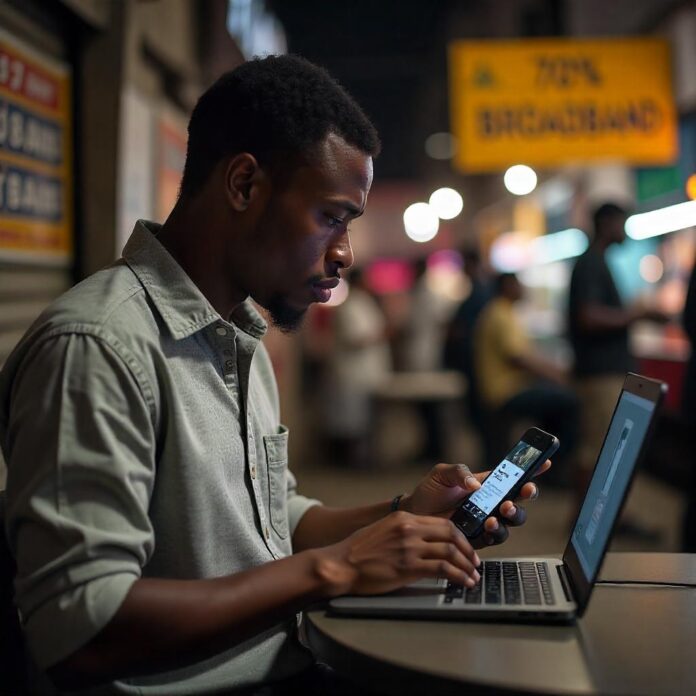The numbers tell a story no one predicted: In May 2025, Nigeria’s internet consumption smashed through the terabyte ceiling to hit 1,043,431.98 terabytes (TB)—shattering January’s record of 1,000,930 TB. This wasn’t just growth; it was a rebellion against economic gravity. Just months earlier, a crushing 50% tariff hike had sent shockwaves through a nation battling 32.47% inflation. Yet here we are—Nigerians didn’t retreat from the digital world. They dove deeper. Why? Because for millions, connectivity isn’t a luxury anymore. It’s survival.
The Tariff Earthquake & Consumer Shockwaves
Picture this: On January 20, 2025, the NCC greenlit a tariff surge that rewrote the rules of digital access. Overnight: 1GB of data jumped from ₦287.50 to ₦431.25, basic voice calls spiked from ₦6.40 to ₦9.60/minute, and family-sized bundles faced brutal markups: A 1.5TB 90-day plan exploded from ₦150,000 to ₦240,000. The backlash was instant. By February, internet usage plummeted 10.8% to 893,054 TB. Mobile subscriptions dropped by approximately 1 million as users rationed data like precious fuel. Lagos freelancer Amara Chukwu typified the struggle: “I disabled mobile data between work hours. Streaming Netflix? That became a luxury for weekends only.” Economists predicted a “digital dark age” for low-income households. But something else was brewing beneath the surface—a quiet mutiny against disconnection.
The Rebound: How Nigeria Hit 1 Million TB Against All Odds
The Climb Back: A Month-by-Month Revolution
Let’s track the data resurrection: February saw 893,054 TB (a 10.8% crash), March rebounded to 995,876 TB (an 11.5% recovery as users adapted), April dipped slightly to 983,283 TB (during an inflation spike), and May shattered records at 1,043,431 TB (an all-time high). This wasn’t luck. It was strategy.
The Resilience Engine: What Fueled the Surge?
Smartphone Revolution: Urban smartphone penetration hit 59%, while 3G/4G/5G connections claimed 61.24% of Nigeria’s 172.67 million mobile subscriptions. Translation: More screens hungry for data. Operator Ingenuity: Telcos turned crisis into opportunity. MTN reported users now devour 12.8GB/month on average—pushing data revenue to ₦529.44 billion in Q1. Airtel saw data use per customer leap 33.4% to 8.4GB/month. How? By repackaging plans: The ₦1,500 “Essential” bundle now offered 1.8GB instead of 1.5GB—a psychological nudge toward loyalty. Infrastructure Leaps: Local internet exchange traffic hit 1 terabit/second—200,000+ concurrent HD streams routed domestically via IXPN, slashing latency and costs. When YouTube watch time soared 55% year-on-year in 2024, Nigerian servers—not foreign satellites—bore the load.
Consumer Adaptation: The New Data Survival Playbook
Faced with steeper prices, Nigerians rewrote their digital DNA: The Great Prioritization meant streaming dropped; essentials surged. Video calls (used by 85% of Nigerians) and mobile banking became non-negotiables. Wi-FI as a Shield became common, with users hunting hotspots at offices, cafes, and bus stops. Bundle Psychology saw mid-tier plans like ₦7,500 for 20GB gaining traction despite higher per-GB costs. Why? Predictable budgeting trumped raw value. MTN Nigeria’s CEO Karl Toriola captured it perfectly: “Demand for data in Nigeria is exceptional—it’s become oxygen, not a commodity.”
Operator Economics: The Billion-Naira Paradox
While consumers tightened belts, telcos thrived: MTN’s Q1 revenue hit ₦1 trillion—a 40.5% year-on-year surge. Airtel’s data revenue rocketed 44.5%, fueled by smartphone adoption. The Hidden Crisis: At ₦431.25/GB, Nigeria missed its National Broadband Plan target of ₦360/GB by 2025. Low-income users risked exclusion even as usage soared. The imbalance deepened: 9Mobile bled 5,809 subscribers in February-March, while MTN hoarded 75.62 million internet users—52.48% market share.
Content Tsunami: Why Videos Drove the TB Explosion
Data doesn’t grow in a vacuum. It’s pulled by content: TikTok/YouTube Surge from 37.4 million TikTok users and 27 million YouTube addicts fueled a video avalanche. When Davido dropped “5ive,” fans burned 9.3 million Spotify streams in one day. The Platform Economy saw Instagram hair vendors and eNaira transactions anchoring digital livelihoods. Fibre’s Quiet Rise meant as mobile data prices pinched, FTTH subscriptions grew 0.42% quarterly—a lifeline for businesses.
Looming Storms: Can the Boom Survive?
The record masks fragility: Broadband Dreams Deferred as penetration languished at 48.81% in May—far from the 70% 2025 target. Rural areas languish at 26% smartphone access. Inflation’s Shadow looms at 32.47%, meaning further tariff tweaks could fracture affordability. Policy Crossroads require solutions tailored to Nigeria’s unique needs, not Western models. As Wave5Wireless CEO Ayowande Adalemo warned: “Copy-pasting Western models won’t work. We need solutions for market traders, not just estates.”
Data as Oxygen in Nigeria’s Digital Lungs
Nigeria’s 1.04 million TB milestone isn’t just a number. It’s a manifesto: Internet access has transcended “utility” to become biological. We rationed, adapted, and prioritized—but we refused to disconnect. The tariff hike exposed our dependence; the rebound proved our ingenuity. Yet the path forward demands balance. Can operators profit without pricing out the poor? Can broadband bridge Lagos and Lokoja? As video calls replace bus rides and eNaira flows replace cash, one truth is undeniable: Nigeria’s digital hunger will keep defying gravity. The terabyte ceiling? Consider it rubble. An industry analyst put it best: “We’ve moved from data as a convenience to data as oxygen.”


